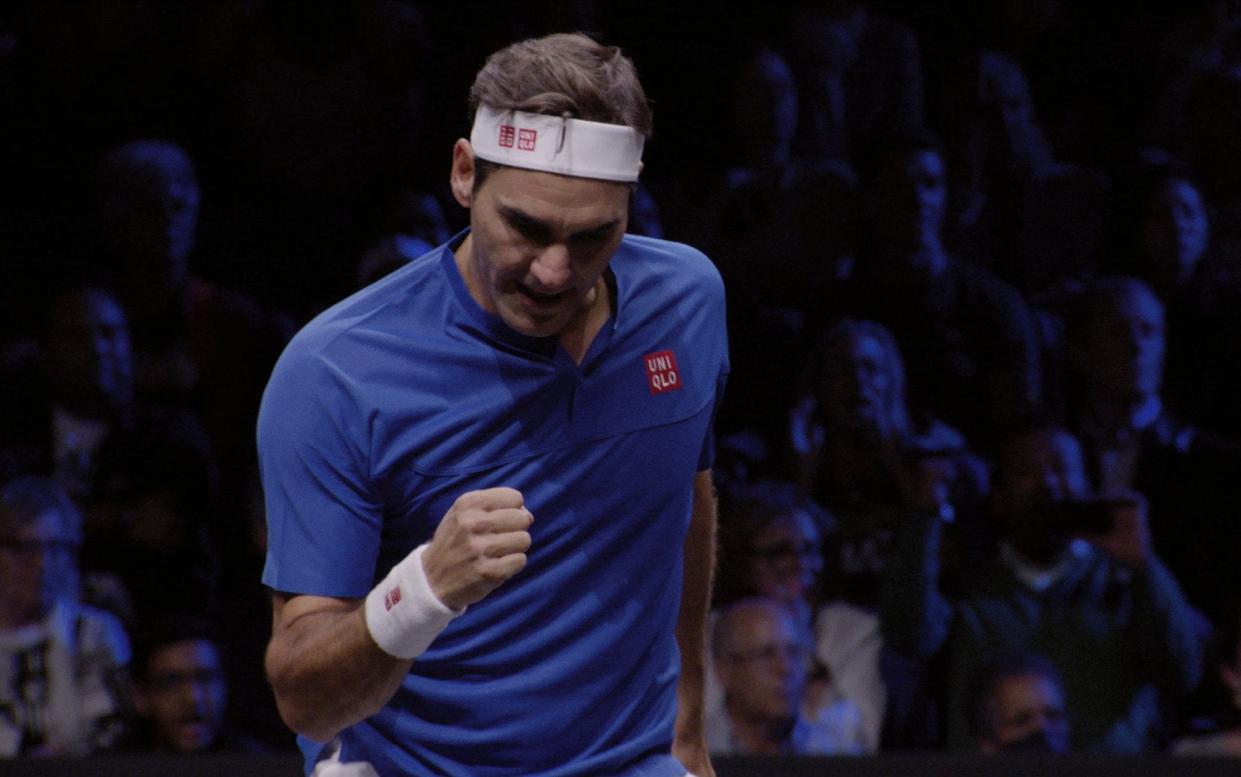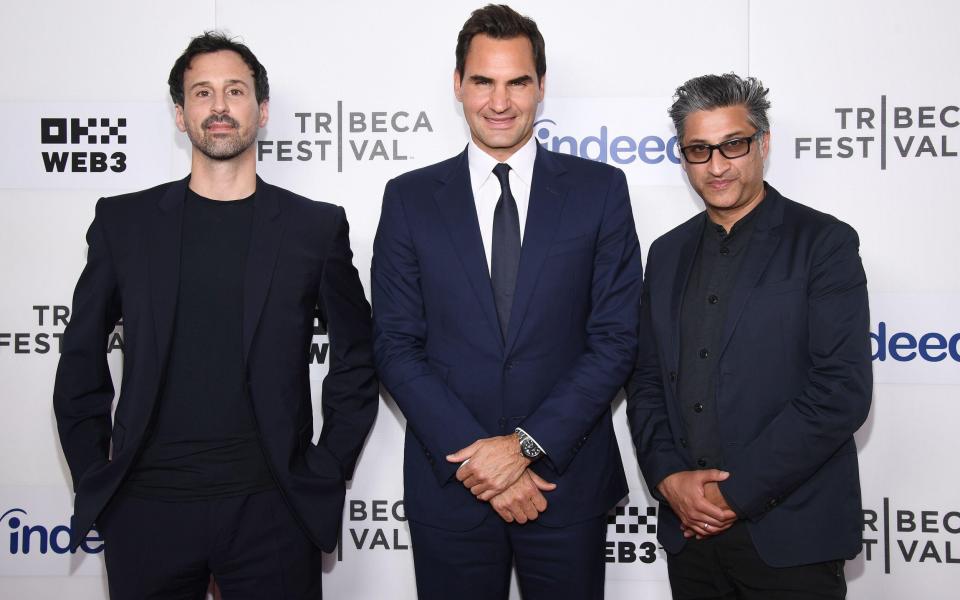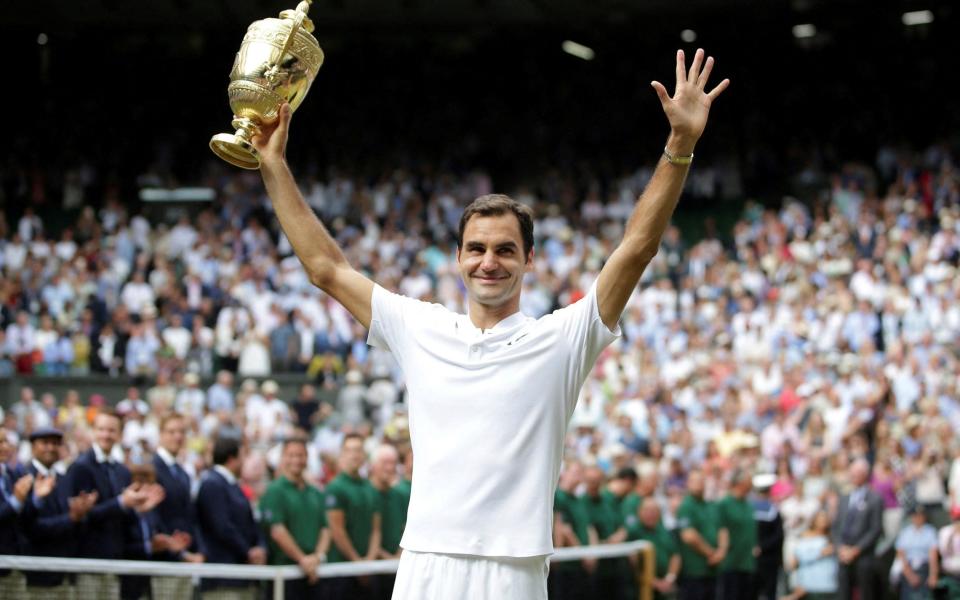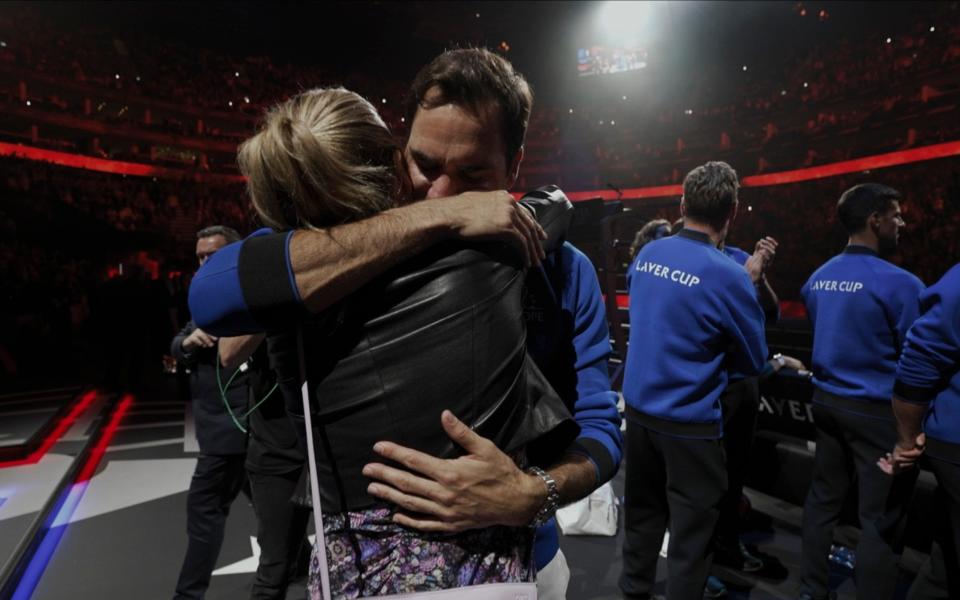The real Roger Federer: ‘He will mess up your mind to beat you’

“No one dies in this film,” says Asif Kapadia, the Oscar-winning British director of Senna, Amy, Diego Maradona and now Federer: Twelve Final Days, about the Swiss tennis great Roger Federer. “But it’s still very emotional in the way that other films are emotional when people die young. Amy [Winehouse] was in her 20s. [Ayrton] Senna died at 34. Roger’s athletic death happens in his 40s.
“I don’t think I’ve seen a film quite like it,” he adds, “where, when someone retires, it’s not done in hindsight, you’re actually there at the moment, you’re in the room, you’re in the car. He’s worrying about retiring. You’re in the locker room, before, during and after, and your greatest rivals are there crying with you because they know it’s them next.”
Kapadia shares the directing credit for the film with Vogue content creator Joe Sabia, who shot all the behind-the-scenes footage. It was tennis fan Anna Wintour who suggested that her friend Roger ask Sabia to film the days leading up to his retirement from the game. Federer had been unable to recover successfully from knee surgery and endured a crushing quarter-final exit at Wimbledon in 2021, losing in straight sets for the first time in 19 years.
There were kingfisher flashes of brilliance that day, fleeting reminders that Federer had once played tennis like a god, but mortality had come knocking and he was moving as if he no longer trusted his own body. It would be his last singles tournament, and by September the following year, this supremely gifted winner of 20 grand slam titles had decided to walk away, at the age of 41.
The person Wintour had suggested was the director of Vogue’s gentle, witty portmanteau video series 73 Questions, in which Sabia poses quick-fire teasers to A-list stars from Adele to Gwyneth Paltrow to Taylor Swift. He had interviewed Federer for the series, too, and he tells me, “Roger was the first and only person to give me a bear hug upon meeting me.” The “private video” he went on to shoot of Federer’s retirement journey, Sabia says, “was probably intended for maybe less than 10 people to see”, before the idea of turning it into a feature film occurred to anyone.
Sabia followed him in the days before the scrupulously timed public announcement, at home with his wife Mirka and their four children in Switzerland, into press conferences, and finally into the locker room with his greatest rivals – Novak Djokovic, Rafael Nadal and Andy Murray – for his last competitive game, a doubles match alongside Nadal at London’s O2 Arena.
The Federer he captured was not radically different from the one tennis fans know well: calm, laid-back, easy-going. There’s something about the way that Federer always seems to be in control that’s reminiscent of Brand Taylor Swift. Did Sabia see the similarity? “Yeah,” he says. “I think a lot of people use the word control. I’m in agreement with that, but what I noticed too, is that very often, the bigger the celebrity, the smaller the circle of people around them. And I’ve never encountered a circle that’s as small as Roger Federer’s. It’s very, very tight.”

When Amazon approached Kapadia to turn the footage into a larger portrait, the director tells me, “My first instinct was, ‘No, not for me’.” Federer is identifiably “different to the kind of characters that I would normally pursue, quite different to the drama that I’m normally looking for”. That’s an understatement. In the edge-walking Winehouse, Formula One ace Senna and the messianic Maradona, Kapadia keys into some of the most scorchingly unpredictable and emotionally affecting figures of our time. But there was something about the footage that caught his attention.
“I’m in my 50s now, we’ve got teenage kids. I’m getting older, and I’m aware of that. And I thought it was an interesting idea to make something about getting old. And the fact that getting old can be emotional, and that is the drama. And then it’s about a group of men crying together. I don’t know what the opposite of toxic masculinity is, but you’ve got these men who have been massive rivals, brilliant athletes, really tough, obviously very macho and massive egos. But I don’t feel that: I feel like, love. And so it’s kind of like a film about people who know the thing they love is going to go away quite soon.”
Kapadia added just one interview of his own with Federer to the film, but it’s one of the most striking in it. The apex predator that Federer used to be on court emerges. “I would take a lot of joy in trying to beat my opponent at his game,” he says. “If he liked to play long rallies, I’d say like, okay, let’s do long rallies. And I’ll beat you at that and then you have nothing else. If you came to the net a lot, then I would say look, I’ll also come to the net and I’ll beat you at that too.”

“I wanted to really understand what’s going on in his head when he plays tennis,” Kapadia says, “and it’s like the one minute, where you kind of see, actually, this guy’s hard and tough, and he will kind of mess up your mind to beat you.”
But the other Federer, he discovered, was for real. He and an editor were with the tennis star in a sound studio in Zurich; Federer had to be at a photoshoot on the other side of town; Kapadia wanted to be there, too. “And I said [to the editor], this will be a funny test, right? We have to get from A to B. We don’t know where we are. Does he offer us a lift?” Federer had turned up in his own car. “It’d be perfectly normal for him not to, because he’s an important guy, and he’s got things to do. And we could get an Uber like you normally do. The interview finished, and he’s like, ‘how you gonna get there?’ I said, ‘we’ll just get a cab.’ He goes, ‘I’ll give you a lift’.”
The trip took a turn for the surreal, he adds, when it turned out Federer didn’t know where he was going either, and had to plug the address into the Waze direction-finding app. “So he puts on Waze, and in Switzerland, he is the voice of Waze, so he was on the machine giving himself directions.”

Later, when they showed him a cut of the film, he says, there were lots of tears from Federer and his wife Mirka, but no hint of “Does my skin look good, or my hair look good, or, you know, is the lighting right? Which is what you get with rock stars, and with other types of fame, they’re worried about how they look. And it was nothing like that.” Federer noticed that one brief clip of his iconic backhand had been repeated and fretted about whether they had made any of the other players look bad, Kapadia says – “You know, are we being too hard on Djokovic?”
The fierceness of that rivalry, which the tabloids loved to call a feud, is only hinted at in Federer’s comments about its early days, “I think I didn’t give Novak the respect he deserved because of his technical flaws,” he says. No surprise perhaps that the player dubbed “the Baryshnikov of the tennis court” by John McEnroe in the film, should have thought that “his backhand for me wasn’t as fluid as it is nowadays”. But Federer notes, too, that the Serb became “an unbelievable monster of a player”.
I mention that one review suggested that the film is true to the dullness of its subject. Is Roger Federer dull? “What are you expecting?” says Sabia. “That’s my answer. I mean, are you expecting Djokovic? Are you expecting Rafa?”
“He doesn’t come across as a tortured genius. He’s not troubled by fame,” Kapadia says. “It’s interesting that it is possible to be brilliant and successful and like a good guy, you know, and to be happy. He seems content and at peace. That is quite rare.”
Federer: Twelve Final Days is streaming on Amazon Prime Video from June 20

 Yahoo News
Yahoo News 
